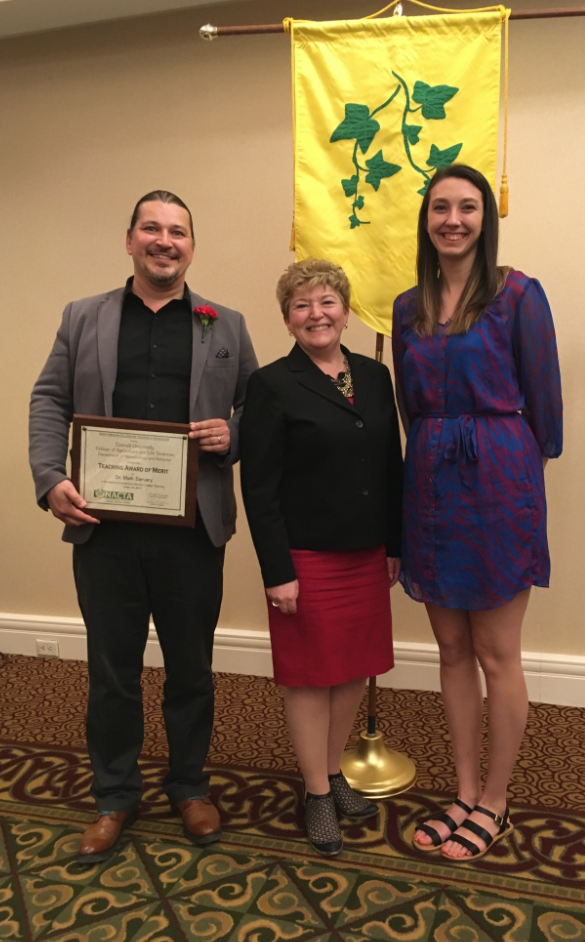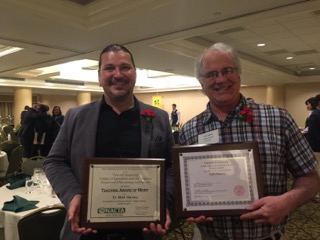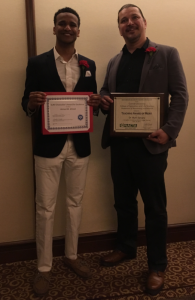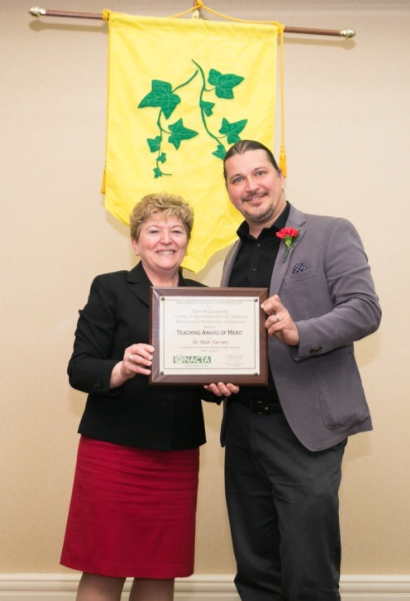Investigative Biology Director receives distinguished teaching award along with former undergrad TA and faculty mentor:
Dr. Mark A. Sarvary, the Director of the Investigative Biology Laboratories, received the North American Colleges and Teachers of Agriculture (NACTA) award from Dean Kathryn Boor, the Ronald P. Lynch Dean of the College of Agriculture and Life Sciences (CALS) and Associate Dean Don Viands. Top students and faculty of CALS attended the dinner at the Statler Hotel Ballroom on April 17, 2017. Awardees walked up to Dean Boor one-by-one after dinner to receive their awards, while Dean Viands highlighted their achievements.
Associate Dean Viands introduced Dr. Sarvary, and quoted some of his students:
“One of his greatest qualities is that he pushes me, and all of his students, to challenge ourselves. This support helps us to reach goals that we may not have thought we could accomplish. He has had many experiences that let him see potential in his students when we cannot see in ourselves.”
Another student wrote,
“I consistently looked forward to that class. While doing experiments, Professor Sarvary explained in lecture why we did certain labs to enable us to understand how these lab techniques could be applied in the real world. . . Professor Sarvary is the best lecturer I have had at Cornell to date. I admire how much he loves what he teaches and hope that I can still be as passionate as he is about biology throughout my career.”

Dr. Sarvary, Dean Boor, and Macey Wilson
Dr. Sarvary was nominated for this award by his advisee, Macey Wilson. Wilson, pictured above, is a Biological Sciences Major and is currently the head undergraduate TA of Investigative Biology. Macey will graduate next month and has been Dr. Sarvary’s advisee since her freshman year.
The North American Colleges and Teachers of Agriculture (NACTA) is a professional organization advancing the scholarship of teaching and learning in agricultural, environmental, natural and life sciences. According to the CALS nomination website, the selection criteria includes evaluation of the following qualities: innovative aspects of the nominee’s teaching, undergraduate and graduate advising, interactions with students and colleagues outside of class, mentoring and motivating students and a national and international footprint.
Dr. Sarvary consistently meets all of those criteria, as he brings modern pedagogical methods into his Investigative Biology class, and trains both undergraduate and graduate teaching assistants how to use these methods. He is involved in service learning and engaging students in activities outside of the classroom. As the science advisor and co-curator of the local science café he recently received a grant from Engaged Cornell to spread the seed of science literacy by involving Cornell students in community-based learning. Dr. Sarvary’s plan is to introduce the local science café called Science Cabaret to undergraduate students via his new Science Communication course (BioG3500). Students will help assess the impact of this science café on community learning, while gaining knowledge about how to start and maintain this type of public science event. He helped the undergraduate debate club called “Debate in Sciences and Health” take off in 2013 and has been the faculty advisor since the club was founded. He has been enthusiastic about advising, and wrote blog posts about his experience with undergraduate teaching assistants and the graduation of his advisees.
Dr. Sarvary’s international footprint will benefit many Cornell students soon. He arrived to the United States as an undergraduate exchange student from Hungary, and wants to create a similar opportunity for Cornell undergraduates to explore education and research at his old alma mater. He has been working closely with the International Office of Szt. Istvan University in Hungary and Cornell Abroad, to create a Cornell in Hungary program to help undergraduate students gain international experience.
This award ceremony was special for Dr. Sarvary at the personal level: one of the first undergraduate teaching assistants of Investigative Biology (Ahmed Ahmed), and a former faculty advisor of the course, Professor Tom Owens received awards from Dean Boor too. Ahmed received the SUNY Chancellor’s Award for Student Excellence. He has been one of the most outstanding biology students at Cornell, and will study at Oxford next semester as a Rhodes scholar. Professor Owens received the distinguished Edgerton Career Teaching Award, honoring his decades long teaching career, especially his contribution to introductory biology. Professor Owens has been a strong supporter of the Investigative Biology labs, and has acted as mentor to Dr. Sarvary in the past years.


Pictured Left: Dr. Sarvary and Tom Owens Pictured Right: Ahmed Ahmed and Dr. Sarvary
For Dr. Sarvary, it was an honor to receive an award along with Ahmed and Prof. Owens and take part in representing three generations of scientists strengthening biology education curriculum at Cornell.
